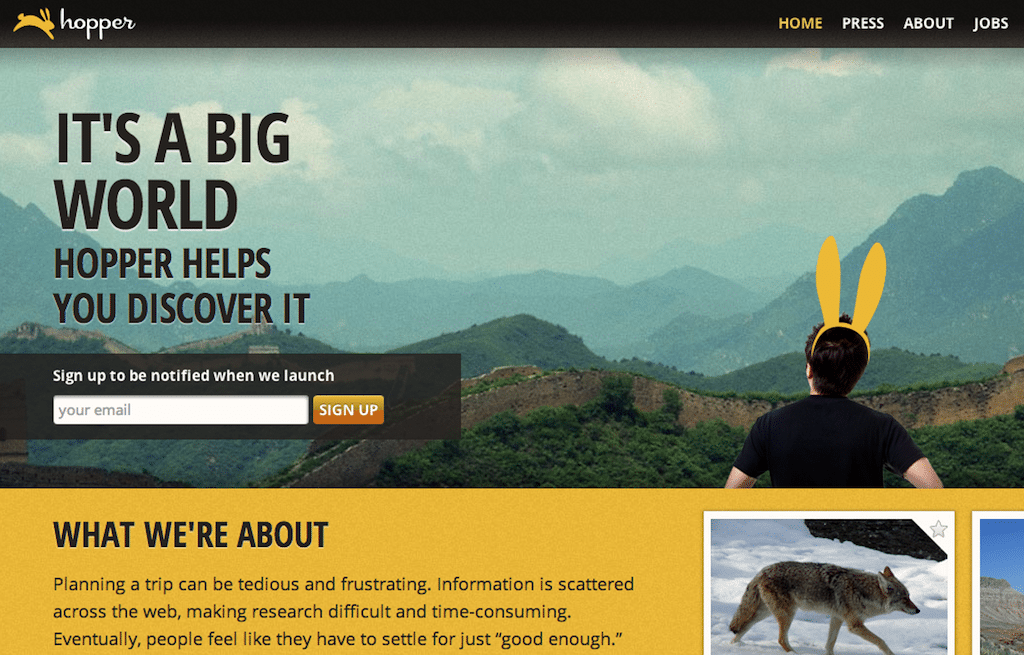Hyped Travel Startup Hopper Does Everything, Except Actually Launch

Skift Take
Founded six years ago, Cambridge, Massachusetts-based Hopper proclaims it has “reinvented the trip-planning experience,” but you’d have to take the company at its word about that because it still hasn’t revealed a product publicly, even in beta.
The company has raised $22 million in funding in two institutional rounds already, prior to its launch, and a year ago, when it received a $12 million Series B funding, it was supposedly close to launching then, but the timetable has apparently been stretched out — again and again, and again.
Six years is a long time. It surely breaks the record for the longest gestated consumer Internet startup of all time.
In 2007, the year that Hopper founder and CEO Fred Lalonde and co-founder and CTO Joost Ouwerkerk created the company in Montreal and started exchanging ideas in a loft, the Great Recession in the U.S. was just about to begin.
SideStep was acquired in 2007 by Kayak. Anyone remember SideStep?
JetBlue stranded passengers for hours on a snowy JFK runway that year, leading to a CEO apology video, and eventually to tarmac-delay legislation.
And, both the Airbus 380 and Virgin America separately announced their first commercial flights in 2007.
It’s been so long since Hopper was founded that you hesitate to even call Hopper a startup anymore.
What Do We Know about Hopper?
Founder Lalonde, who as CTO sold distribution-services company NewTrade Technologies to Expedia in 2002, is a Big Data evangelist, and is very well-regarded in travel-tech circles.
Erik Blachford, the president of Expedia North America when Expedia acquired NewTrade Technologies, yesterday characterized Lalonde as “a remarkable guy,” adding he believes the 6-year “gestation period means Hopper will be a pretty impressive baby when it arrives.”
But, Blachford hasn’t seen the product so his belief is merely an educated guess based on reputation.
In a video, Lalonde says Hopper has built the world’s largest database of structured travel information based in part by culling about 50,000 travel blog posts and photos that he argues are created on a daily basis. Actually, he says bloggers write 1 million posts daily, and about 3% to 5% of them are travel-related, so do the math.
Layered on top of that database of travel information is an archive of about 100 billion airline ticket prices that Hopper has received from three providers.
Hopper has supposedly cracked the trip-planning nut by using all of this Big Data, and running it through sophisticated algorithms to enable travelers to make informed decisions and find great travel deals.
Fred – Why Hopper is unique from Hopper on Vimeo.
Lalonde claims Hopper has dispensed with the need to enter travel dates and airport codes, and instead they can submit text using natural language and just indicate they want to fly to a beach where it is warm in February, for example.
Using its massive database and a whole lot of hardware, Hopper is geared to provide relevant recommendations and enable travelers to continue their trip-planning through maps and in other visual ways.
Lalonde showed me a limited demo of Hopper two-and-a half years ago, and at that time Hopper’s data only covered Spain. In a lightning-fast manner, Hopper displayed search results, including flight and destination information, with lots of pins on maps.
We’ve Heard It All Before
But, how well does Hopper fulfill its mission?
It’s candidly anyone’s guess because few people outside the inner circle have seen the product, and although Hopper personnel make lots of claims about internal testing with users, it’s all been held close to the vest.
User interface gurus among the Hopper team of 20+ claim to regularly visit coffee shops to test coffeeholics’ experiences with the product, and they employ tools such as UserTesting.com to vet the product.
Hopper has done every kind of marketing about itself and its founders, without an actual product to show publicly. It has some great videos about how great it is to work there. It has been doing regular hackathons in the Boston area — around Scala, Storm, Finagle and whatever else the tech team’s working on — and keeps on writing about these events on its Tumblr blog, and yet, nothing.
The Litany of Trip Planning Startups
There have been great claims of breakthroughs in travel before, and most of them have amounted to nothing. Just look at AngelList for two minutes, or think of the claims of several Expedia alums who a couple of years ago acquired TravelPost from Kayak, and boasted that they had invented an entirely new travel category related in some way to trip-planning. The team had the finest resumes, but they closed operations within a year or so, admitting failure in this particular venture.
Turning unstructured data — including travel blogs of wildly divergent quality and reliability — into consistent, meaningful and actionable structured data is a humongous challenge, and you might be able to assess how reliable the results are by having the guts to present them to real travelers in the heat of the moment.
And, you have to test your premises with thousands of users, before iterating and testing again.
But Hopper hasn’t done this, and apart from its walled garden creative process, Hopper faces other challenges amidst all of the anticipation and hoopla.
Even if its technology and team turn out to be over-the-top impressive, Hopper will have to prove the merits in the real world.
Companies with great technology before Hopper have seen it all retired and moth-balled because it was either developed before its time, or consumers just didn’t care.
In the real world, several airlines have experimented with map-based search and open-ended trip-planning with no set destination in mind, along the lines that Hopper is talking about, and the carriers have found these features to be little-used, with a very small addressable market.
Will consumers really become invested in all of Hopper’s touted bells and whistles?
Do they want to search for trips in a Pinterest-like visual way?
And, even if they do, how would Hopper get noticed and scale the business?
Lalonde seems to try to deflect the criticism about Hopper’s six years without a public product by stating that Hopper only really started operating as a company when it moved its main offices from Montreal to Cambridge less than a year-and-a-half ago.
Meanwhile, Hopper’s investors include OMERS Ventures, Brightspark Ventures and Atlas Venture. At least one of them is either tight-lipped about the company’s status and prospects, perturbed, or merely following the Hopper script.
In that regard, Derek Smyth, managing director of OMERS Ventures, which led the latest funding round a year ago, declined to comment about Hopper. And Lalonde didn’t respond to a request for comment.
Thus, proof of the reinvention of trip-planning will have to wait a few more months — or perhaps years.





